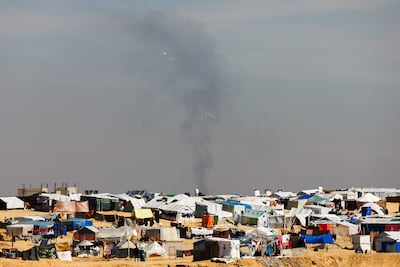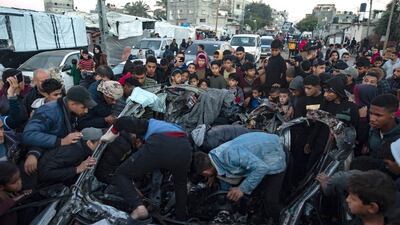Live updates: Follow the latest news on Israel-Gaza
Prime Minister Benjamin Netanyahu on Friday ordered the military to come up with a plan to expel people from the city of Rafah in Gaza, as Israel prepares a new military offensive the US has warned could spell “disaster” for civilians already living under desperate conditions.
Rafah is one of the few remaining places in Gaza that has not already been extensively bombed. The city had a pre-war population of about 280,000 but now hosts another 1.4 million who fled fighting elsewhere in the territory, according to the UN.
After destroying Hamas strongholds across much of the rest of the Gaza Strip, Israel now wants to move on Rafah, where it says battalions of militants remain and operate a network of smuggling tunnels bringing weapons and supplies in from neighbouring Egypt.
“It is impossible to achieve the goal of the war without eliminating Hamas, and by leaving four Hamas battalions in Rafah,” Mr Netanyahu's office said in a statement.
“On the contrary, it is clear that intense activity in Rafah requires that civilians evacuate the areas of combat.”
Mr Netanyahu therefore has ordered the Israeli military “and the security establishment to submit to the cabinet a combined plan for evacuating the population and destroying the battalions”, the statement added.
The US State Department has said any military operation in Rafah would be a “disaster” unless civilian safety is given due consideration.
“To conduct such an operation right now with no planning and little thought in an area where there is sheltering of one million people would be a disaster,” State Department spokesman Vedant Patel said on Thursday.
The alarm was echoed on Friday by the UN and EU.
“There is a sense of growing anxiety, growing panic in Rafah because basically people have no idea where to go,” said Philippe Lazzarini, the head of the UN Palestinian refugee agency UNRWA.
Spokesman Stephane Dujarric said UN Secretary General Antonio Guterres was “extremely worried about the fate of civilians in Rafah”.
“What is clear is that people need to be protected, but we also do not want to see any forced displacement – forced mass displacement – of people,” Mr Dujarric said.
The EU's foreign policy chief Josep Borell meanwhile warned of a dire outcome for any military assault on Rafah.
“It would have catastrophic consequences worsening the already dire humanitarian situation and the unbearable civilian toll,” he said on X.
Jonathan Conricus, an Israeli army reservist who recently completed a tour as a senior international spokesman for the Israel Defence Forces, acknowledged that “tremendous suffering” was possible.
“But at the end of the day, there are things that need to be done in war to defeat an enemy,” Lt Col Conricus told The National at a think tank panel in Washington.
“Israel cannot defeat Hamas without taking out the tunnels in Rafah.”
Israeli forces have shifted their offensive south towards Rafah after initially storming northern Gaza in response to the October 7 attack by Hamas gunmen who rule the coastal strip.
Doctors and aid workers in Rafah are struggling to provide even basic aid to those sheltering there, many of them penned up against the border fence with Egypt and living in tents.
“No war can be allowed in a gigantic refugee camp,” said Jan Egeland, secretary general of the Norwegian Refugee Council, warning of a “bloodbath” if Israeli operations expand there.



